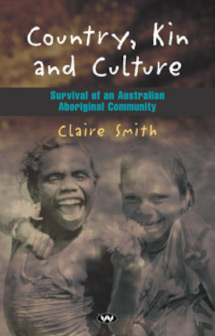Country, kin and culture by Claire Smith

Wakefield Press, 2020. ISBN: 9781862545755.
(Age: Senior secondary/Adult) Highly recommended. Dr Claire Smith
writes that slowly over the years since 1990, after many visits in a
research capacity, she and her husband and son have become a small
part of the extended community of the Barunga-Wulgularr people of
the Northern Territory. Encouraged by elders to write a history of
the group, her book acknowledges the input of Phyllis Wiynjorroc,
Petrer Manabaru and Jimmy Wesan.
In telling the story of the Barunga-Wulgularr, Smith has had by
necessity to document the many policy changes that applied to
Aboriginal people across Australia, and so her book becomes a
documentation of the long history of government impact on Aboriginal
lives, from colonial violence to the policies of protectionism and
then assimilation, the cruelty now known as the Stolen Generations,
to the contemporary movement towards self-determination and
reconciliation.
The thing that is so refreshing about this book is that it is not
just another history book about Australian Aboriginals, it is a book
that includes their voice and their stories, sharing their
experience, so that readers may begin to understand just how
intrusive government control has been and how devastating the
consequences for people's lives. That intrusion, that lack of
respect, continues today despite the findings and recommendations of
the National Inquiry into the Separation of Aboriginal and Strait
Islander Children from their Families, and the Royal Commission into
Aboriginal Deaths in Custody. Aboriginal socio-economic disadvantage
continues.
I found Smith's thoughtful examination of the role of alcohol in
Aboriginal social life, and her inclusion of Aboriginal comment on
it, to be a particularly insightful approach that dispels
stereotypical views.
Smith writes that despite all that has gone before, a distinctly
Indigenous world view has survived. The culture of the
Barunga-Wulgularr has adapted to include respected elders of other
groups in their society following the government dispersal of people
from their lands; they have developed a unique language, Kriol, to
communicate between groups; and they have embraced art as a way of
sharing without revealing the secret knowledge within ceremonial
painting. Aboriginal culture and Aboriginal systems of knowledge
have endured; that's something to celebrate.
Themes: Aboriginal history, Aboriginal culture, Dispossession,
Discrimination, Stolen Generations, Survival.
Helen Eddy